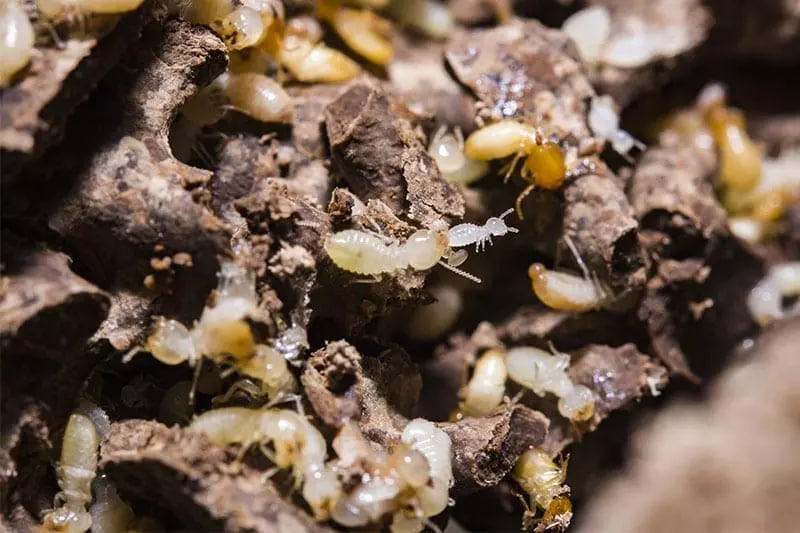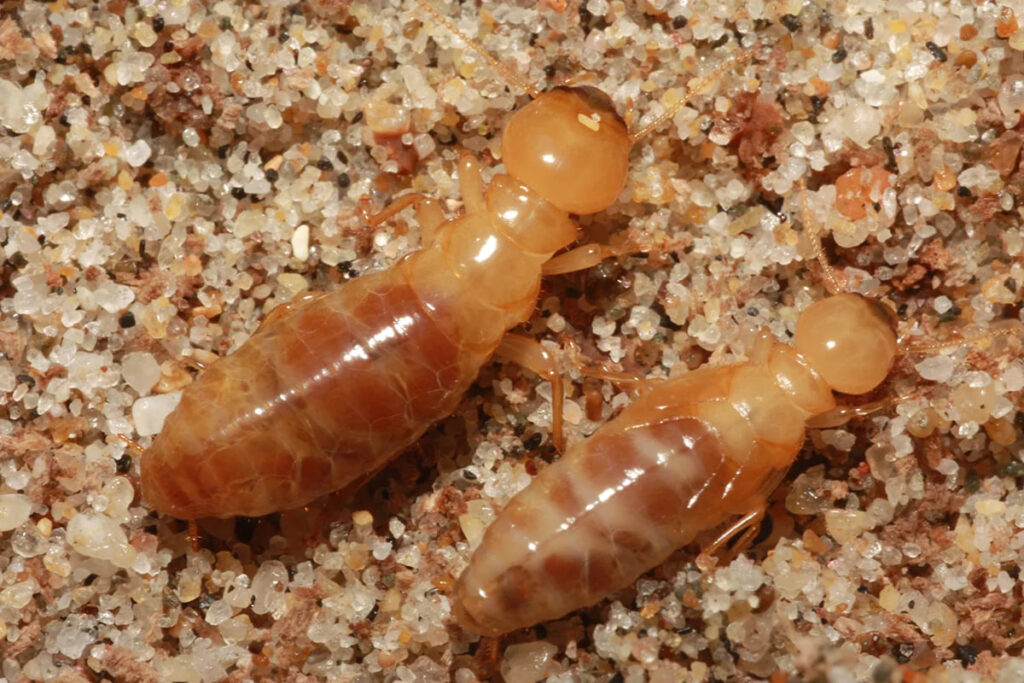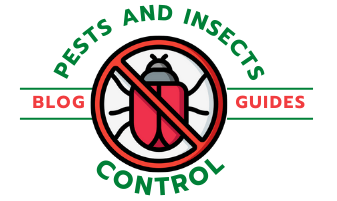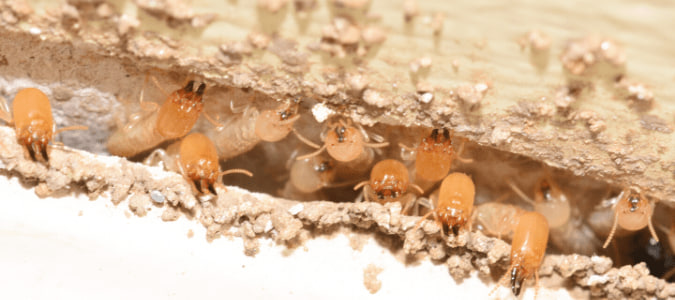Can you hear termites in the walls? Termites are one of the costliest yet most common pests found in homes and they often go unnoticed. If you hear any clicking, buzzing or tapping sounds coming from within your walls, it could be an indicator of a potential termite invasion. These sounds are usually made by the worker termites who communicate similar to ants within their colonies.
The termite sounds could also be caused by them chewing through wood and getting closer to the inside of your home. It’s important to keep an eye out for these signs, as termites feed can cause extensive damage to a property if they’re left undetected and untreated.
Understanding common termite sounds is critical for determining whether there could be a severe infestation in your home and what potential damage it could bring. If you’re dealing with a termite issue, don’t fret – the answers to all your common questions about termite noises lie below.
With this knowledge, you can take the steps necessary towards resolving a pest issue before it becomes anything more.

What are termites?
Termites are a fascinating species of insect, small and light in colour ranging from white to brown. Despite their tiny size these insects have found a way to survive by using wood cellulose as their food source. If you’ve ever mistakenly thought that termites feed were ants then now you know the difference!
Home-owners should be aware of the telltale signs that may indicate a termite infestation in their home. These could include mud tracks snaking around walls and baseboards, piles of wood dust on flooring or furniture, strange clicking noises coming from inside the walls and mysterious insect wings scattered across surfaces.
Termites can often lurk in the shadows, causing destruction before you even notice they’re there. But if you know what to listen for, then these sneaky pests aren’t so hard to detect! Creaking noises near your walls could be a sign of termite activity – always remember to keep an ear out just in case.

Can you hear termites in the walls?
Have you seen the telltale signs of a termite infestation in your home? Fallen wings, mud tubes, and even hollowed wood are all indicators. But if that’s not enough evidence for you — listen carefully! Termites make noise as they move about their daily routines – so keep an ear open to hear them out…literally!
While they may typically remain unseen, termites make their presence known in a creepy nighttime soundtrack. At its most subtle level, the faint crunching noises emitted from an infestation can be difficult to detect – but if left unchecked and allowed to grow larger, it leads to chaotic rustling sounds that are sure to capture your attention!
What do termites sound like in the walls?
Termites may be small, but they can make a mighty noise! Be aware of the different tones and pitches these pests produce – from clicking to chirping. If you suspect that your home has been infiltrated by termite chatter, don’t hesitate to contact Pest Aid for help with removal.
HEAD BANGING
When a termite colony’s survival is threatened or food sources are discovered, the strongest and loudest sound of their communication fills the air. A unique rattling rhythm vibrates from head banging sounds against walls, signifying an urgent call to action amongst these little creatures.
Soldier termites have a unique way to communicate danger – banging their jaws and shaking their bodies. This creates rippling vibrations that are felt through the entire colony, allowing them to alert each other of potential threats despite being unable to hear for themselves!
BUZZING
Tiny termites fill the air with a gentle yet distinct hum, providing an enchanting auditory backdrop to nature.
HOLLOW SOUNDS
Termites are stealth destroyers, wreaking havoc in the dark. They gnaw away at floors and walls until entire sections become weakened and produce a haunting, hollow sound when tapped – an ominous warning of further imminent destruction! If left unchecked for long enough even hardwood floors can start to creak underfoot as termite activity slowly saps it of strength.
CLICKING
As termites chomp on wood, a symphony of tiny clicks fills the air – like popcorn popping in the night! Even more curious is their own self-made sound produced by vibrating mouths as they create intricate passages through logs.
TAPPING
If you ever hear a mysterious tapping sound coming from your wall, it might not be the supernatural – just some termites with headbanging habits! These critters are known to thump away inside walls in an attempt to communicate and make their presence heard.
SWARMING
As spring approaches, the air buzzes with an orchestra of chirps – it’s termites! These tiny creatures’ wings create a symphony as they take flight in search for new places to call home.
Is termite noise constant?
Inhabiting homes like clockwork, termites work tirelessly throughout day and night. A chorus of their incessant chirping is guaranteed at any hour – though most easily detected during the tranquil hours after dark when all else is still.
When danger is near, termites don’t hibernate – they start banging! To alert their peers of looming peril, these industrious insects will pound away at walls with frantic fervor. Not only does this create a warning for other colony members to take caution but it also emits an audible ruckus that us humans can hear too.
As if being on high-alert weren’t enough work already, swarms of airborne termites produce further sound waves from buzzing and rustling as they scurry through timberlands in search of safety.
Do termites make a crunching sound?
Termites have a relentless appetite, munching away on wooden structures night and day. Their insatiable chewing produces an ever-present quiet crunch that is much milder than the sound of headbanging.
Expert termite control is crucial
Don’t wait until it’s too late – if you see any signs of termites in your home, call the experts at Pest Aid right away! With over 25 years’ worth of experience and some truly cutting-edge technology on our side, we’ll quickly detect and destroy those pesky pests before they do even more damage. So don’t hesitate; contact us today for a safe and efficient solution to all your termite woes.
What do termites in the wall sound like?
Occasionally termites hear rattles and squishing sounds when they travel around the wood to find a source of food.
Do termites make a lot of noise?
Termites make very loud sounds that can only be heard in the absence of sound. You need to use stethographs for termite detection. If you swivel over wood to protect against termites, a hollow sound is possible.
Can you hear termites eating at night?
Can the termits only be heard at night? Termites work and eat all day and are never sleepy, so they make constant noises. During the night the noise can also be detected easily. Termite noise is then visible to the eye and is easily detected.
Have you ever hear noises coming from inside your walls? It could be a smattering of soft clicking sounds or the occasional creaking. If this is the case, you may want to look into if there are termites in your walls.
Termites can chew through wood, insulation, and even some forms of plastic, causing untold damage to your home. Contact a professional inspector right away; they will be able to perform an inspection and let you know if termites are in fact the cause of the noise in your walls.
As termites silently make their way through your walls in search of food, it is a rare occurrence to hear them chewing on wood. Although termite damage can be enormous due to the sheer number of termites present in an infested area you could go for years without hearing a single noise emanating from the walls.
Termites are nocturnal, so if you find yourself hearing noises in the wall at night, it may be worth investigating further to ascertain whether termites are present and causing the sound. Don’t be alarmed; termites will rarely make noise loud enough for humans to hear but if you do catch a faint chewing sound then it is far better to identify and treat termite damage as soon as possible.
Read more: Are termites attracted to light: Causes

